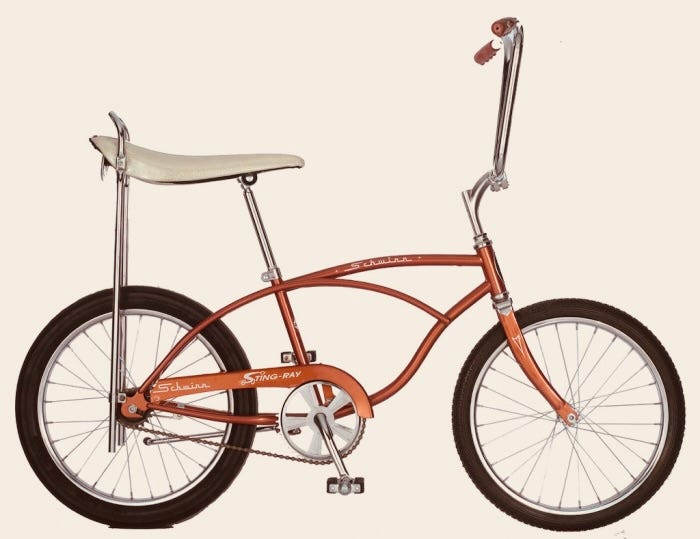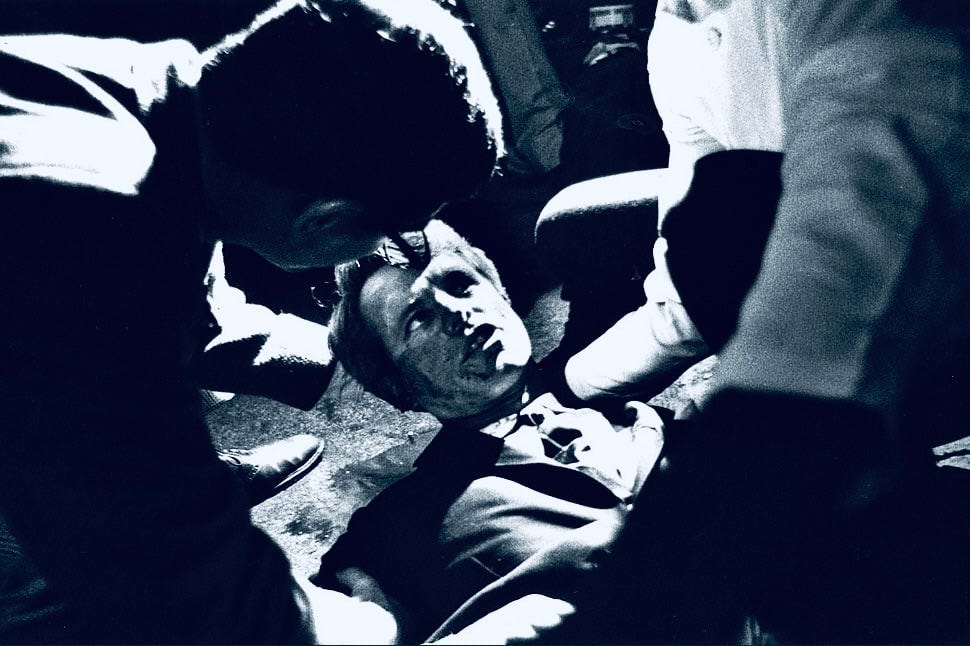The Blues & Billie Armstrong 29
JAMES + EVIE
Previously in The Blues & Billie Armstrong…
But there was something different about her that day, something changed, sharpened, something beyond the uniform—a new aura of competence and intent, the stride of someone who could see the path ahead. As Grandma Junia would say, she walked like she had a purpose in life. But it felt like she might be walking away from me.
My father and Darlene were out the door early Sunday morning for a drive to Santa Rosa.
Their day trips and date nights had become a regular thing—part of the piecemeal honeymoon strategy they devised because the Call & Record couldn’t put out a newspaper without my father, or so said Grandma Junia. I was the accidental beneficiary of these outings, left on my own without adult interference more often than I’d ever been in the past.
Meanwhile, Billie was at the Weeping Willow shuttling ham and eggs to bleary fishermen and hungover bikers and dreaming of open highways. Fine, I didn’t need her. My father and Darlene would be gone all day. I had the pink lipstick envelope and the gas station road map. By my calculations, I could make it to Frankie’s store in an hour and a half on my bike.
I’d pedaled for what felt like an hour, but I wasn’t halfway there. If you’re riding in a car, a long steady incline goes by in the window almost like flat ground, but on a one-speed Schwinn Sting-Ray the same stretch of road is a thigh-burning test of manhood.
The late-morning sun climbed the sky and scorched the right side of my face. The dusty wind choked my throat and the sweet sticky smell of insecticide floated up from the pear orchards on either side of the raised road. Big diesel trucks honked by and nearly blasted me off the narrow shoulder.
There was a gravel turnout at the crest of a hill and I pulled over, swung off the bike and toed the kickstand down, walked around to shake out my legs, prepare myself for perhaps another hour of pedaling the rolling landscape of Lupoyoma County—not to mention the trip back. I should’ve brought a canteen of water, should’ve worn cutoffs, probably should’ve stayed home.
A Ford van came coughing and sputtering up the road and I recognized Garfunkel’s dirty-blonde head bouncing along behind the windshield. He did a double-take and pulled over, tires spitting gravel, and stopped just short of the bike. At least his brakes were working now.
He leaned over and rolled down the passenger window. “Hey man, don’t I know you?”
I refreshed his memory. He said, “You look a little lost out here by yourself.” When I told him I was headed to Frankie’s store, he said, “Okay, so you’re not lost, just late. Better throw your bike in the back, dude.”
He didn’t say what I was late for. He opened the passenger door and the smell of hot pizza tumbled out of the van. I rode in the front seat holding two pizza boxes on my lap. Garfunkel wore mirrored aviator sunglasses and the same striped bell-bottoms and naked hairy chest with a necklace of rawhide and wooden beads. Leather-strapped tire-tread sandals worked the gas and clutch as the van rattled down the road and Garfunkel rattled on about how he first met Frankie a year ago when he shipped back from Vietnam with a “bitch of a heroin habit” and it was Frankie who nursed him through the horror of cold turkey withdrawals.
“She’s good people. I’m gonna miss her,” he said, but he didn’t say why and he didn’t stop talking long enough for me to ask. We passed the junkyard and he slowed the van and downshifted, backfiring loudly as we pulled into Frankie’s dirt parking lot and came to a stop next to a giant U-Haul truck with a long ramp sticking out the back.
Garfunkel said, “Bring those pizzas, man.”
Strangers issued forth from The Bus Stop’s front door, lugging boxes and furniture up the ramp and into the U-Haul. Garfunkel made introductions: there was beefy and sweaty Ben Parker from the junkyard, slow-moving Old Sam from the beer-and-bait shack, and shy Gilberto from the fruit stand. Turned out Garfunkel’s real name was Howard, but these folks all called him Howie.
Finally I caught on. “Frankie's moving?”
“Had enough of the bullshit, man.” Howie pointed to the front of the store.
Past the big U-Haul truck I saw huge spray-paint letters scrawled across the front of the store, bright orange against the white cinderblock wall: GO BACK TO AFRICA COMMIE NIGGER. I was startled. Yes, this wasn’t Berkeley, but it also wasn’t Birmingham. This was the first time I’d ever seen the word displayed so openly in Lupoyoma. Not that it wasn’t tossed around in private conversations, even occasionally on the schoolyard by certain kids, but my mother had taught me this was a word that brought shame to the speaker, not their target.
The glass had been busted out of the window and the door, and swept into piles we carefully stepped around. Inside it was hot and stuffy and the store was a jumble—stacks of packed boxes, knocked-over towers of books on the floor, bare naked tables, half empty shelves, broken chairs piled like bodies awaiting mass burial, garbage bags with the arms of child-size sweaters dangling out the top.
Frankie appeared from behind the big antique cash register. She wore faded jeans and the green and dirty grocer’s apron, her gray hair pushed back with a purple headband, dark arms shining with the heat. She took the pizza boxes and set them on a table, looked me up and down.
“Now, what can I do for you today, young man?”
“Well, I was here several days ago and—”
“You and that redhead girl. I remember.”
I had stashed the envelope inside my shirt. I undid a button, reached in and grasped it with fingertips but hesitated. Under Frankie’s suspicious glare, the day’s enterprise suddenly seemed embarrassing, ridiculous, unexplainable.
“What’s in your shirt, boy?”
I looked at the battered linoleum floor. No words came. I slid the envelope out and held it in the space between us.
“What’s this?” She took the envelope, examined it thoughtfully. Both sides.
“Uh, my mother died last year and—”
“Evie King, that’s your mother?”
“Yes, ma’am. Was.”
She looked at me warily, took a deep breath, processing the information. “Well, I’m very sorry to hear Evie passed.” She tried to give the envelope back, but I didn’t take it.
“You’re Mrs. Watkins… aren’t you.”
Frankie looked down at the envelope in her hand and shook her head like people do when they’re reminded how life tends to swirl around in circles. “I see,” she said. “This is why you and the girl were out this way before?”
“We were looking for J.R. Cole. We didn’t know you were you then.”
Old Sam shambled in with a styrofoam cooler full of ice and beer and plopped it down next to the pizza boxes. The rest of the moving crew hustled in one by one. Ben Parker proved he could open beer bottles with his teeth and the men laughed and joked while Frankie shooed them out the broken door, saying “Go on now, I got business with this young man.” The men drifted outside to the parking lot and Frankie turned back to me.
“What’s your name again?” she said.
“Archer King.”
“Well, Archer King, I think you better have a seat and tell me exactly what you think you’re doing here.”
We sat in old straight-back chairs at an old round table and she set the envelope down in front of her. I told how my mother died in the blue flowered sundress and how I found her in the dayroom, the envelope peeking out of her pocket, and how I couldn’t bear to tell anyone until Billie came along. “You poor child,” Frankie said.
I told her about Billie finding the hatbox and the love letters addressed to my mother in care of Mrs. Watkins. She smiled when I told her how Billie and I listened to the blues records over and over that first day. She laughed about our ride with no-brakes Garfunkel, and she looked away when I spoke of her crumbling old house on Rawson Road.
“I’m just trying to find out the truth about my mother,” I said.
She pushed her chair away from the table, stood up and walked outside and returned shortly with two Cokes from the vending machine. She set one in front of me, wiped the other icy bottle across her forehead, placed it back on the table and sat down. She kept her eyes on me the whole time, reading me, seeming to question my heart. Then she spoke in that weary, gravel voice.
“I called him James, and so did your mother by the way, although he preferred J.R. and had other nicknames as well. He was a Greyhound bus driver, if you didn’t know. The bus don’t come out here any more, but this was the end of the line then, and I used to let the drivers stay the night in the back room. Had a little cot back there and I’d bring down a plate of food from the house. But after James met your mother—well, she’d be waiting in her car when the bus pulled in and they’d go off together. It got to be a regular thing. Then he got the draft notice. Started talking about Canada. Quit his job. And then I had to stick my nose in… like a damn fool.” She took a long drink from her bottle of Coke.
“My son, Daniel, he got drafted in 66, been up in Vancouver ever since, so I asked him to help James get settled up there. I was gonna drive him to Portland, and Daniel would come down and take him over the border. That was the plan. All James had to do was lay low until I could take a few days off. I made up a bed for him in the attic—that’s how he found those old records. I put them all away after my husband died, but James found them and he played some of them over and over, same as you kids.” She dug a lighter and a pack of Salems out of her apron pocket, shook one out and lit it and blew smoke toward the ceiling.
“But James, he was always in a hurry—for everything,” she said. “And then that night Bobby Kennedy was shot… well, we were all… shattered, I guess is the word. You know, for a little while we really believed he would change the country, the world. And when he died, well, a lot of us lost hope. And that was it for James—he made up his mind to go right away. He bought a used car from Ben Parker across the street, and he left with nothing but a grocery bag full of clothes… and your mother. I knew they were asking for trouble and I told them so. Nobody important would miss James Cole, but sooner or later somebody would come looking for a white lady with Mrs. in front of her name. Sure enough, a few days later, cops banging on my door.”
She waved a hand at the mess around us, the half-empty shop and the swept-up glass and the disarray. She gave it all an arms-wide what-the-hell shrug. “You see how that worked out.”
The Blues & Billie Armstrong is a work of fiction. Names, characters, businesses, places, events and incidents in this book are either the product of the author's imagination or used in a fictitious manner. Any resemblance of the fictional characters to actual persons, living or dead, is purely coincidental.
© All Rights Reserved



